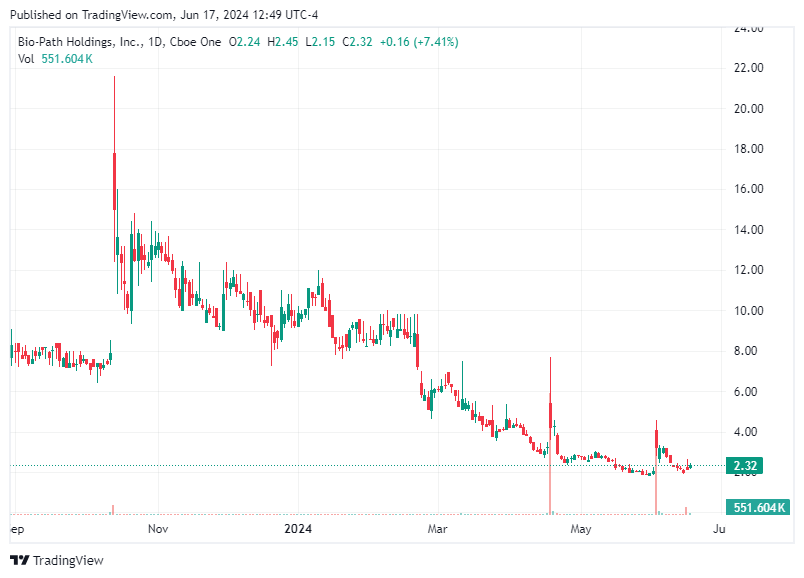Biotech Company Reveals Major Data From Acute Myeloid Leukemia Study
Bio-Path Holdings Presents Data from Ongoing Phase 2 Combination Study of Prexigebersen for Treatment of Acute Myeloid Leukemia at European Hematology Association Congress.

Disclaimer: This article is for informational purposes only and does not constitute medical advice. Always consult with a healthcare professional for medical advice and treatment.
Real-time information is available daily at https://stockregion.net
Bio-Path Holdings, Inc., a biotechnology company listed on NASDAQ under the ticker symbol BPTH, is leveraging its proprietary DNAbilize® liposomal delivery and antisense technology to develop a portfolio of targeted nucleic acid cancer drugs. On June 14, 2024, the company presented interim results from its ongoing Phase 2 study of prexigebersen (BP1001) in combination with decitabine and venetoclax for the treatment of acute myeloid leukemia (AML). The presentation took place at the 2024 European Hematology Association (EHA) Congress in Madrid, Spain.
Presentation Overview
Dr. Jorge Cortes, the Director of the Georgia Cancer Center, was responsible for presenting the data. The findings showed that prexigebersen continues to demonstrate high tolerability and compelling efficacy in two different reporting cohorts. These cohorts included evaluable newly diagnosed AML patients and evaluable refractory/relapsed AML patients. Both cohorts exceeded outcomes when compared to frontline therapy.
Peter Nielsen, the Chief Executive Officer of Bio-Path, expressed enthusiasm about presenting these promising results to an international audience of oncologists. He emphasized the importance of global awareness regarding prexigebersen and its potential as a new therapeutic option for AML.
Detailed Data Highlights
Cohort 1: Newly Diagnosed AML Patients: A total of 31 newly diagnosed patients were enrolled in this cohort. Among these, 20 patients were evaluable for efficacy (9 males constituting 45% of the evaluable group), with a median age of 75 years (ranging from 69 to 84 years). These patients had either adverse-risk AML, as defined by the 2017 European LeukemiaNet (ELN) guidelines, or secondary AML (sAML) evolved from other conditions such as myelodysplastic syndromes, chronic myelomonocytic leukemia, or treatment-related AML.
Out of the 20 evaluable patients:
15 patients (75%) achieved complete remission (CR), CRh (complete remission with partial recovery of peripheral blood counts), or CRi (complete remission with incomplete hematologic recovery).
2 patients achieved partial remission (PR).
2 patients had stable disease (SD).
Cohort 2: Relapsed/Refractory AML Patients: This cohort consisted of 38 relapsed or refractory AML patients. Of these, 23 patients were evaluable for efficacy (13 males making up 57% of the evaluable group), with a median age of 63 years (ranging from 24 to 89 years). Similar to the first cohort, patients had either adverse-risk AML or sAML.
Out of the 23 evaluable patients:
12 patients (55%) achieved CR, CRi, or CRh.
1 patient achieved PR.
8 patients had SD.
1 patient experienced treatment failure.
Among the evaluable patients from both cohorts, the adverse events reported were consistent with those typically expected with decitabine and venetoclax treatments and/or AML. The common adverse events included:
Fatigue (72%)
Anemia (60%)
Neutropenia (49%)
Severe adverse events were also reported, with febrile neutropenia occurring in 26% of the patients and sepsis in 5%.
About Bio-Path Holdings, Inc.
Given the promising interim results, Bio-Path Holdings plans to continue enrolling up to 98 and 54 evaluable patients for Cohorts 1 and 2, respectively. This continuation aims to provide more comprehensive data on the efficacy and safety of prexigebersen in combination with decitabine and venetoclax for treating AML. Bio-Path Holdings, Inc. is a biotechnology company focused on developing DNAbilize®, a novel technology that facilitates the administration of RNA interference (RNAi) nanoparticle drugs through simple intravenous transfusions. The company's lead product candidate, prexigebersen (BP1001), targets the Grb2 protein and is currently in a Phase 2 study for blood cancers. Additionally, BP1001-A, a modified version of prexigebersen, is in a Phase 1/1b study for solid tumors.
Disclaimer: This article is for informational purposes only and does not constitute medical advice. Always consult with a healthcare professional for medical advice and treatment.
Real-time information is available daily at https://stockregion.net

